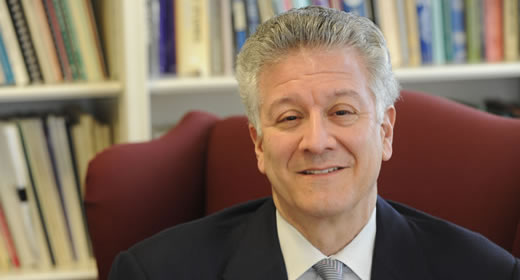
The Last Word
Distinguished University Professor Sheldon H. Danziger is one of the nation's foremost experts on poverty and inequality. He has led the National Poverty Center (NPC) since 2002.
S&H: Tell us about the NPC's Michigan Recession and Recovery Study.
SD: The project is designed to understand how workers, families, and children in southeast Michigan were affected by the Great Recession and the extent to which they are recovering from the economic shocks. Our research team has completed two waves of interviews with respondents from the Detroit metro area, with a third planned for spring 2013.
S&H: How does Detroit's current experience compare with other areas and other recessions?
SD: Detroit was hit harder than the rest of the country because—like a number of Rust Belt cities along the Great Lakes—it was already suffering from post-industrial decline.
To the extent that there's any good news, it's that the Detroit area went from having an unemployment rate a lot higher than the U.S. average in 2009 to a little bit higher than average today. Nonetheless, unemployment in the state is still around 11 percent. It's much higher in the central city of Detroit and for people who have no more than a high school degree.
Overall, the job loss was much steeper and the recovery has been much slower than in past recessions. The Federal Reserve Board and the CBO project that unemployment rates are going to remain high through 2014.
S&H: Americans seem to be talking about inequality: is that a real shift in the political landscape, one that might spur action on poverty and inequality?
SD: The good news is there is more discussion, particularly in the media, about increased inequality. Peter Gottschalk and I wrote a book called America Unequal in 1995 and nobody wanted to talk about it. Certainly Occupy Wall Street has cast a big spotlight on this issue not only in the U.S. but in other countries as well. But I don't see, unfortunately, any political will to move forward. As an example, the Republicans in Congress refuse to even consider a millionaire's tax to help reduce the deficit, much less to use the revenues to support programs for the poor and unemployed.
The highest earners have captured most of the income gains of the last 15 or 20 years. Their tax rates were lowered dramatically by the Reagan tax cuts, modestly increased in the Clinton era, then cut again under (G.W.) Bush. All President Obama has proposed is to bring them back to the levels of the 1990s when economic growth was robust.
"Deficit mania"—which has also swept the media—means that even the Democrats are much more willing to cut spending than to raise taxes. Most economists believe the Stimulus Bill and the Federal Reserve actions kept us from falling into a world depression in late 2008 and early 2009. But somehow politicians have forgotten that government spending that increases deficits during recessions helps prevent further economic collapse and helps the unemployed from greater hardship.
We have a long-run deficit problem and we need to rein in the growth of entitlements. There are ways to do so that wouldn't affect the poor and the unemployed, but that's not what's being discussed.
So while there's currently more attention to the problem, the political situation is dismal. I'm not optimistic at all, given the high unemployment rates and the deficit cuts we know are coming. Poverty in 2020 is likely to be higher than in 2000, and in 2000 it was about the same as in 1973. We live in a country which basically has embraced inequality.
S&H: What new projects are underway at the NPC?
SD: We're working with the Mott Foundation to plan eight seminars on the causes and consequences of poverty, followed by a large public event in September 2012 to mark the 50th anniversary of the publication of Michael Harrington's The Other America. Also, (economist) Martha Bailey and I are editing a volume on the legacy of the war on poverty, to come out in January 2014—the 50th anniversary of LBJ's declaration of war on poverty.
S&H: You're a big Michigan basketball fan. Are you willing to go on the record with a season prediction?
SD: [laughter] Yes, I've been a basketball season ticket holder for almost 20 years, and unlike my pessimistic views about the U.S. Congress, I'm optimistic that the basketball team will have a good season.
S&H: A tournament team?
SD: I hope they're a tournament team.
Below is a formatted version of this article from State & Hill, the magazine of the Ford School. View the entire Winter 2012 State & Hill here.
